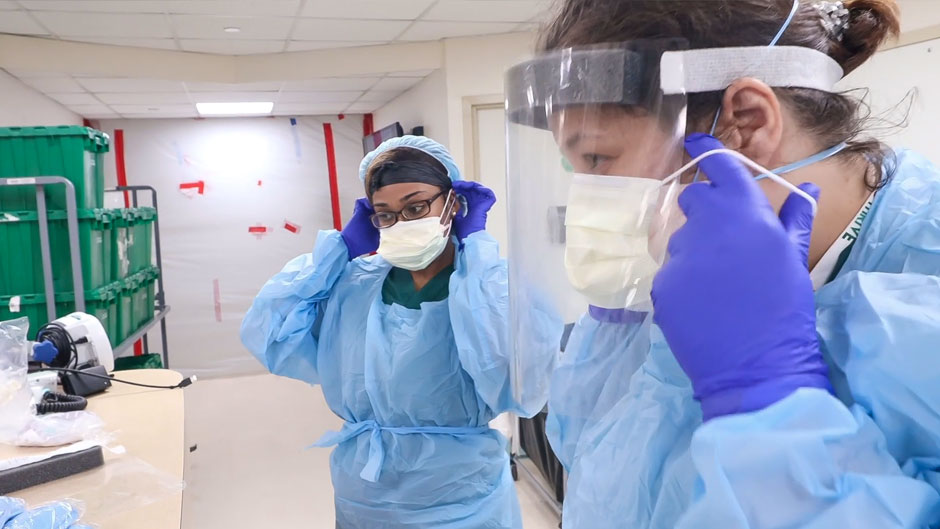The confidential questions that health care providers asked at the University of Miami’s first wellness webinar were as difficult to hear as they were to read out loud.
How do I deal with being afraid to go to work? What happens if my anxiety gets out of control? How do you ease a panic attack? How do I deal with the anger and irritability I am feeling constantly?
“For me, the questions were really heart wrenching,” said clinical psychologist Deborah Jones Weiss, professor of psychiatry and behavioral sciences, who has spent decades helping vulnerable people navigate life with HIV. “When I was reading the questions, I felt their fear.”
That palpable fear underscored the urgent need for the new UHealth Wellness Program that Jones Weiss and a small army of other mental health experts eagerly joined to help health care providers cope with the psychological toll of treating patients with the highly infectious novel coronavirus that has disrupted every facet of our lives—and significantly compounded the stressors providers normally face.
As Jones Weiss, the co-director of the Center for HIV and Research in Mental Health (CHARM) said, “How can we ask health care providers to take care of us if we aren’t willing to care for them?”
Organized by the Miller School of Medicine’s Department of Psychiatry and Behavioral Sciences, in collaboration with CHARM and the Department of Psychology at the Colleges of Arts and Sciences, the wellness group recently kicked off a series of webinars and group sessions for physicians, nurses, residents, fellows, and support staff. They are aimed at providing self-care strategies and resources for minimizing distress, fostering resilience, and preventing burnout that was common among health care providers even before the pandemic required them to risk their lives to take care of gravely ill patients—and stand in for family members who can’t visit them.
Nearly 100 people tuned into the first webinar, which Jones Weiss and CHARM director Steven Safren, an international expert in cognitive behavior therapy and anxiety disorders, led earlier this month. The first two of a set of four weekly group sessions begin Tuesday evening, one focusing on grief and the other on mindfulness. The next two, which will take place Thursday evening, focus on managing anxiety and on parenting and family issues.
More than 70 Department of Psychiatry and Behavioral Sciences faculty members and community clinicians also have joined forces to offer free, confidential, and individual telephone or telehealth coaching sessions for health care professionals who need help coping with the new demands of their jobs. The sessions are designed to help them draw on their strengths and build their resilience. If needed, they can get referrals for additional mental health care.
As Safren noted during the first webinar, there should be no shame or hesitation in seeking such coaching. “Please continue to do what you can. But don’t burn out, because we need you. And, the way that you don’t burn out is that you take care of your mental health,” he said. “It’s just like having a physical health problem. If you think you may need help or guidance, you should get it.”
Dr. Radu V. Saveanu, professor and executive vice chair of the department, said planning for the wellness program began before China confirmed the existence of the virulent pneumonia-like disease in December. By then, Dr. Joan St. Onge, the Miller School’s senior associate dean for faculty affairs and interim chair of the Department of Medical Education, had asked him to develop an ongoing program to address the psychological and emotional needs of clinical faculty and staff. The primary goal, Saveanu said, was to help health care professionals develop a healthy work/life balance and avoid burnout.
But as COVID-19—which has infected more than 3 million people and killed more than 210,000 around the world—began its relentless march to South Florida, the program took on a new urgency. Suddenly, it had to address a rapidly unfolding crisis for health care workers, many of whom can no longer unplug and recharge at home. There, they often worry about infecting and comforting homebound loved ones, who are struggling with their own fears and anxieties over their disrupted lives.
“You can call what we’re doing an emotional Band-Aid,” Saveanu said. “It’ll get us through right now, but what we’re talking about is what we need to have in place for the next wave—when the pandemic begins to wane and the psychological needs begin to surface. Generally, when there’s a crisis, we deal with the crisis and push our mental health needs aside. So right now, we’re providing a lot of support and coping strategies. But I’m afraid the next wave will be more treatment-intensive.”
For now, the personal coaching and group webinars, which Jones Weiss likens to President Franklin Delano Roosevelt’s “fireside chats,” will continue to deliver the kind of informative and reassuring messages like those that helped a traumatized nation get through the Great Depression and World War II.
During the first webinar, Jones Weiss and Safren concentrated on strategies that can help health care providers find the middle ground between feeling they must be strong and do it all and feeling too overwhelmed to do anything. While they assured listeners that such feelings are normal, they emphasized that they must be dealt with.
“Anxiety is a natural reaction to unpredictable, uncontrollable stress, and it’s a very natural reaction to a threatening situation, which this is,” Safren said. “We are in a situation with COVID-19 where the stress is continued, and we’re trying to mitigate that and slow down the reaction to prevent the conversion of acute stress to chronic stress.”
For a list of available mental health resources visit the CHARM website. For more information, email umpsychewellness@med.miami.edu or charm@miami.edu or contact the Miller School Office of Faculty Affairs.

